Review
#10 Best Mountain Bicycles of 2023
Are you ready to conquer the trails in 2023? Look no further, because we’ve got the inside scoop on the best mountain bicycles of the year. From the versatile Ibis Ripmo V2 XT to the adrenaline-pumping Specialized Stumpjumper EVO Comp, HookBike’s we handpicked the top rides for every type of trail. Whether you’re a technical wizard or a short-travel enthusiast, we’ve got you covered. Get ready to hit the dirt and find your perfect ride.
Best Overall Trail Bike: Ibis Ripmo V2 XT Review
If you’re looking for the best overall trail bike of 2023, you can’t go wrong with the Ibis Ripmo V2 XT. This bike is a true gem in the world of mountain biking, offering an impressive blend of features and performance that sets it apart from the competition.
The Ibis Ripmo V2 XT is built with top-of-the-line components, including Shimano XT drivetrain and brakes, ensuring smooth and precise shifting and reliable stopping power. The bike also features a carbon fiber frame, which not only provides excellent strength and durability but also keeps the overall weight down for enhanced maneuverability on the trails.
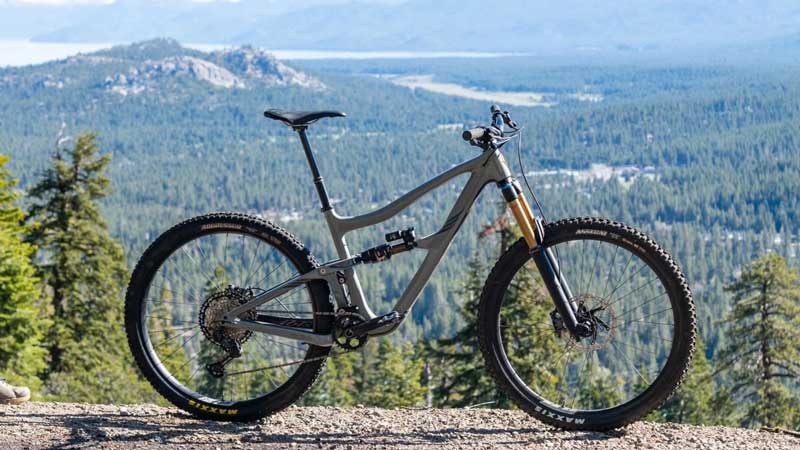
When it comes to performance, the Ibis Ripmo V2 XT shines. With its aggressive geometry and 160mm of front travel and 147mm of rear travel, this bike is ready to tackle any trail with confidence and ease. The DW-link suspension system ensures efficient pedaling and excellent traction, allowing you to climb steep inclines and descend technical sections with ease. The bike’s 29-inch wheels and wide tires offer excellent rollover capability and stability, giving you the confidence to take on any obstacle in your path.
Best Mid-Travel Trail Bike: Trek Fuel EX 9.8 GX AXS Gen 6
Looking for a top-notch mid-travel trail bike in 2023? Look no further than the Trek Fuel EX 9.8 GX AXS Gen 6. This bike is a true masterpiece, combining cutting-edge bike suspension technology with a lightweight and responsive frame.
One of the standout features of the Fuel EX 9.8 GX AXS Gen 6 is its advanced suspension system. It is equipped with Trek’s proprietary RE:aktiv with Thru Shaft technology, which provides an incredibly smooth and controlled ride over rough terrain. This innovative suspension design allows the bike to maintain traction and control, even on the most challenging trails.
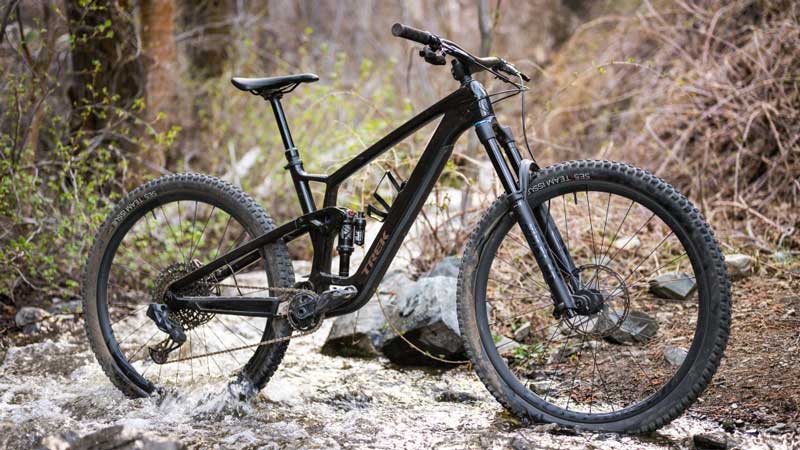
When it comes to frame material, the Fuel EX 9.8 GX AXS Gen 6 offers both carbon and aluminum options. Carbon frames are known for their lightweight and stiffness, providing excellent power transfer and maneuverability. On the other hand, aluminum frames are more affordable and offer durability and strength. The choice between carbon and aluminum ultimately depends on your personal preferences and budget.
Best Aggressive Trail Bike: Specialized Stumpjumper EVO Comp
Now let’s delve into the realm of aggressive trail bikes with the Specialized Stumpjumper EVO Comp. When it comes to aggressive trail bike features, the Stumpjumper EVO Comp stands out among its competitors. Specialized has designed this bike to excel in rough and technical terrains, offering riders the confidence and control they need to tackle challenging trails with ease.
Compared to other brands in the market, the Stumpjumper EVO Comp comes equipped with top-of-the-line components and cutting-edge technology. Its frame is constructed using Specialized’s FACT 11m carbon fiber, making it light yet incredibly durable. The bike’s geometry has also been optimized for aggressive riding, with a slack head angle and a longer reach for stability and control at high speeds.
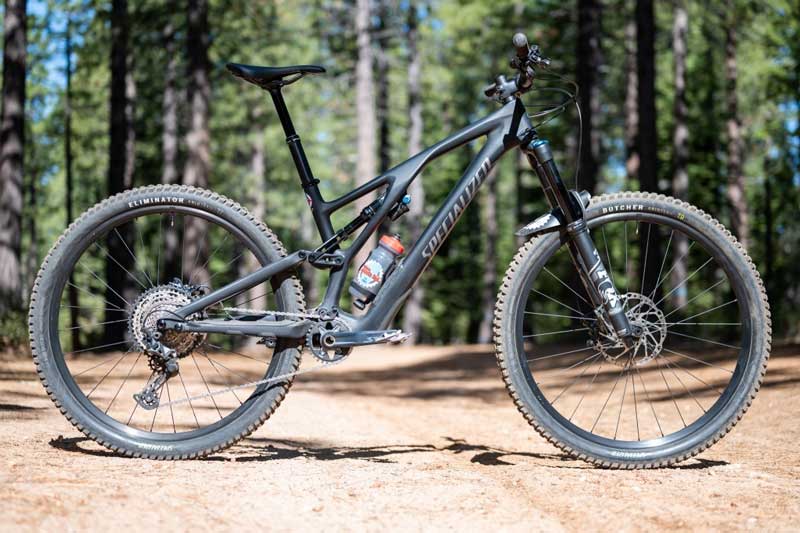
The Stumpjumper EVO Comp features a suspension system that combines a FOX FLOAT DPX2 rear shock with a FOX 36 Performance Elite fork, providing a plush and responsive ride over rough terrain. The bike’s 12-speed drivetrain ensures smooth and efficient gear changes, while the powerful hydraulic disc brakes offer reliable stopping power in any conditions.
When it comes to aggressive trail riding, the Specialized Stumpjumper EVO Comp is undoubtedly a top contender. Its exceptional features and performance set it apart from other brands, making it an excellent choice for riders seeking a bike that can handle the most demanding trails with ease.
Best Technical Trail Bike: Yeti SB140 LR T2 TURQ
When considering the best technical trail bike for 2023, you can’t go wrong with the Yeti SB140 LR T2 TURQ. This bike is a true masterpiece of engineering, designed to tackle the most challenging trails with ease. Let’s take a closer look at its impressive specifications and innovative suspension technology.
The Yeti SB140 LR T2 TURQ is built to handle anything the trail throws at it. It features a lightweight carbon frame that is both stiff and durable, allowing for maximum power transfer and control. With its 140mm of rear travel and 160mm fork, this bike is ready to take on rough descents and technical climbs with equal prowess.
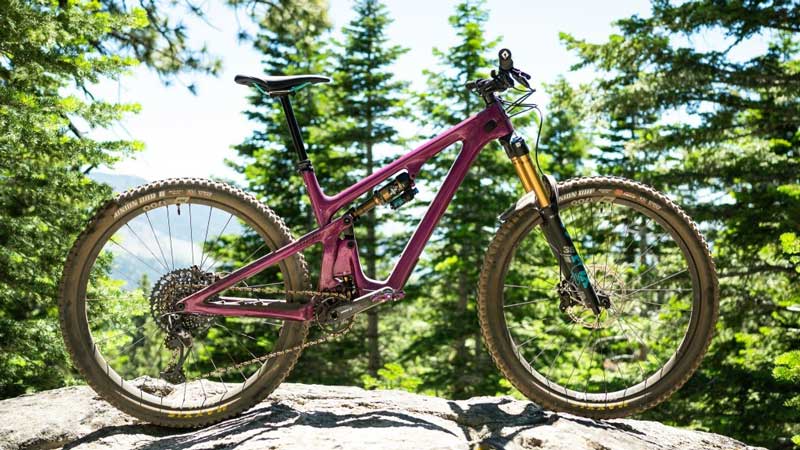
One of the standout features of the SB140 LR T2 TURQ is its suspension technology. It is equipped with the renowned Yeti Switch Infinity suspension system, which delivers a plush and responsive ride. This system allows the bike to maintain excellent traction and control over rough terrain, ensuring a smooth and confident ride.
In addition to its impressive suspension, the SB140 LR T2 TURQ boasts a range of high-quality components. From the reliable SRAM drivetrain to the powerful Shimano brakes, every part of this bike is carefully chosen to enhance performance and reliability.
If you’re looking for a technical trail bike that can handle anything you throw at it, the Yeti SB140 LR T2 TURQ is the perfect choice. Its top-of-the-line specifications and advanced suspension technology make it a true trail beast. Get ready to conquer the most challenging trails with confidence and style.
Best Short-Travel Trail Bike: Ibis Ripley GX Eagle
To find the best short-travel trail bike for 2023, consider the highly recommended Ibis Ripley GX Eagle. This bike is packed with impressive features and a top-notch suspension system that will enhance your riding experience.
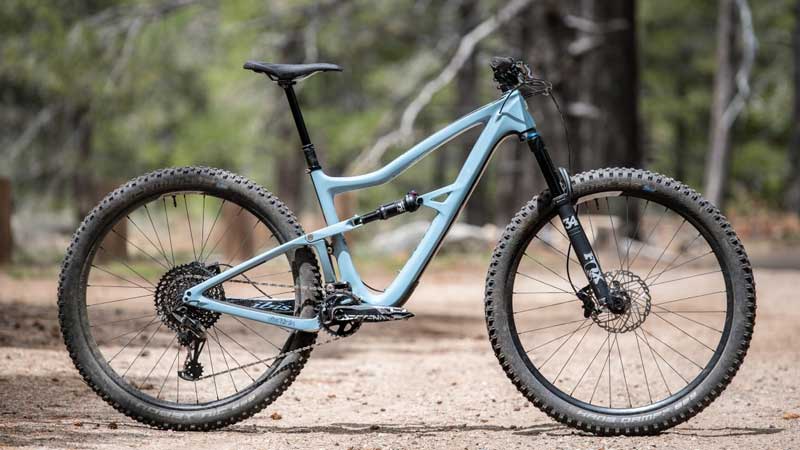
The Ibis Ripley GX Eagle boasts a lightweight and sturdy carbon frame, making it agile and responsive on the trails. It features a short-travel suspension system with 120mm of travel, which strikes the perfect balance between efficiency and capability. This means you can climb with ease while still being able to tackle technical descents with confidence.
The suspension system consists of a DW-Link design, which is known for its excellent pedaling efficiency and traction. It keeps the rear wheel planted on the ground, allowing you to maintain control and momentum even on rough terrain. The bike also comes with a Fox Float DPS shock, which further enhances its performance by offering smooth and consistent damping.
In addition to its exceptional suspension system, the Ibis Ripley GX Eagle is equipped with a reliable SRAM GX Eagle drivetrain, powerful Shimano brakes, and a dropper seatpost for added versatility. These features combined make the Ibis Ripley GX Eagle the best choice for riders who want a short-travel trail bike that excels in all aspects of trail riding.
How to Buy a Mountain Bike
If you’re looking to buy a mountain bike, it’s important to consider several factors to ensure you make the right choice. Buying a mountain bike can be an exciting and rewarding experience, but it can also be overwhelming with the wide range of options available. To help you navigate through the process, here are some key buying considerations and budget options to keep in mind.
Firstly, it’s important to determine your budget. Mountain bikes can range in price from a few hundred dollars to several thousand dollars. By setting a budget, you can narrow down your options and focus on bikes that fall within your price range. Consider what features and components are essential to you and prioritize accordingly.
Next, think about the type of terrain you’ll be riding on. Mountain bikes come in various categories, such as cross-country, trail, enduro, and downhill. Each category is designed to excel in different types of terrain, so it’s important to choose a bike that matches your riding style and preferences.
Another consideration is the bike’s frame material. Common options include aluminum, carbon fiber, and steel. Each material has its own strengths and weaknesses, so it’s important to research and understand the characteristics of each before making a decision.
Lastly, don’t forget about the bike’s components. The drivetrain, suspension, brakes, and wheels all play a crucial role in the bike’s performance. Look for components that are durable and reliable within your budget.
Where do you want to ride
When it comes to choosing the right mountain bike, one of the first things you need to consider is where you want to ride. Are you looking for a bike that excels on long cross-country trails, or do you prefer the challenge of technical descents on rocky terrain? Perhaps you enjoy a mix of both, in which case a versatile trail bike might be your best bet.
Understanding the different types of bikes available, such as cross-country bikes, trail hardtails, short-travel trail bikes, mid-travel trail bikes, and enduro bikes, will help you make an informed decision that aligns with your riding preferences and goals.
Cross-Country Bikes
Choose a cross-country bike that matches your preferred riding terrain. When it comes to cross-country riding, choosing the right suspension is crucial. A bike with too much suspension travel may feel sluggish and inefficient on smoother trails, while one with too little may not be able to handle rougher terrain.
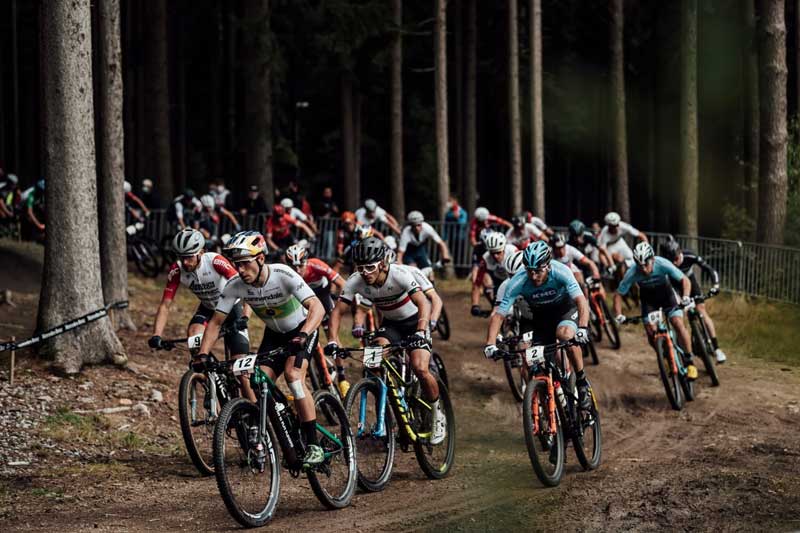
Look for a bike with a suspension system that offers a good balance between efficiency and control. Additionally, don’t overlook the importance of bike fit. A properly fitted bike ensures optimal comfort and control, allowing you to ride longer and faster with less fatigue.
Consider factors such as frame size, reach, and handlebar width to find a bike that fits you well. So, whether you prefer smooth flowy trails or technical descents, choose a cross-country bike that suits your riding style and terrain.
Trail Hardtails
Decide where you want to ride and find the perfect trail hardtail for your adventures. Trail hardtails offer a unique riding experience, combining the efficiency of a hardtail with the capability to tackle technical trails. These bikes excel in rough terrains, making them the go-to choice for riders who love the thrill of off-road riding.
One of the advantages of trail hardtails is their lightweight design. With fewer components, they are easier to maneuver and climb steep inclines. They also provide a more direct power transfer, allowing you to accelerate quickly and conquer challenging climbs.
When comparing trail hardtails to full suspension bikes, the main difference lies in the rear suspension. While full suspension bikes offer superior comfort and traction on rough trails, trail hardtails provide a more efficient pedaling experience and better climbing abilities. They are ideal for riders who prioritize speed and agility on smoother, less technical trails.
Short-Travel Trail Bikes
If you’re looking for a versatile mountain bike that can handle a variety of terrains, a short-travel trail bike is the perfect choice for you. These bikes are designed to excel on technical trails while still providing a comfortable ride.
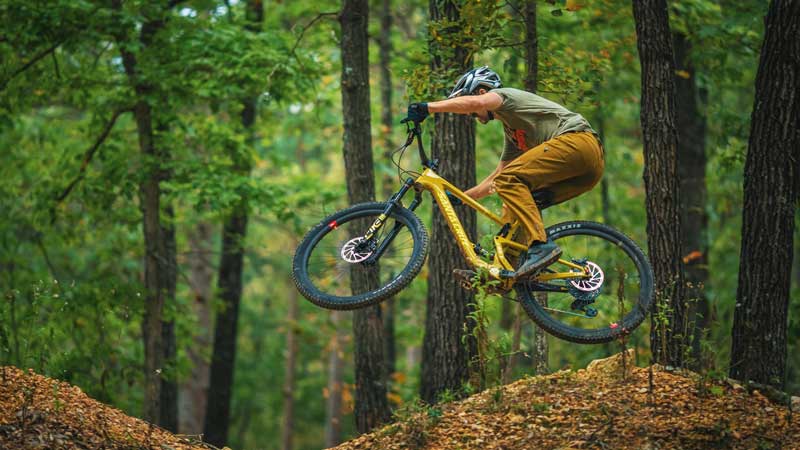
When choosing a short-travel trail bike, one of the most important factors to consider is the suspension. The suspension system determines how well the bike can absorb bumps and impacts, ensuring a smooth and controlled ride. Look for a bike with a suspension fork that offers enough travel to handle rough terrain, but not too much that it sacrifices efficiency.
Additionally, frame material is another key consideration. Aluminum frames are popular for their durability and affordability, while carbon frames offer a lighter weight and increased stiffness. Ultimately, the choice between frame materials comes down to personal preference and budget. So, whether you’re tackling fast descents or conquering technical climbs, a short-travel trail bike will provide the agility and versatility you need to take on any trail.
Mid-Travel Trail Bikes
When it comes to selecting a mountain bike for your desired riding destinations, mid-travel trail bikes are the perfect choice. These bikes strike a balance between uphill efficiency and downhill prowess, making them versatile machines for tackling a variety of trails. With advancements in bike suspension technology, mid-travel trail bikes are now more capable than ever before.
Top mountain bike brands such as Specialized, Trek, and Santa Cruz offer a wide range of mid-travel options that cater to different riding styles and preferences. These bikes typically have around 130-150mm of suspension travel, allowing them to handle rough terrain with ease while maintaining a nimble and responsive feel.
Whether you’re tackling technical climbs or ripping down fast descents, mid-travel trail bikes excel in providing a smooth and controlled ride. They offer enough suspension to absorb big hits and maintain traction, while still being efficient enough for long climbs. So, no matter where you want to ride, a mid-travel trail bike is the ideal companion to take on your adventures.
Enduro Bikes
Looking to push your limits on the trails? Where exactly do you want to ride with an enduro bike? Enduro bikes are specifically designed for the demanding sport of enduro racing, where riders face steep descents, technical climbs, and everything in between.
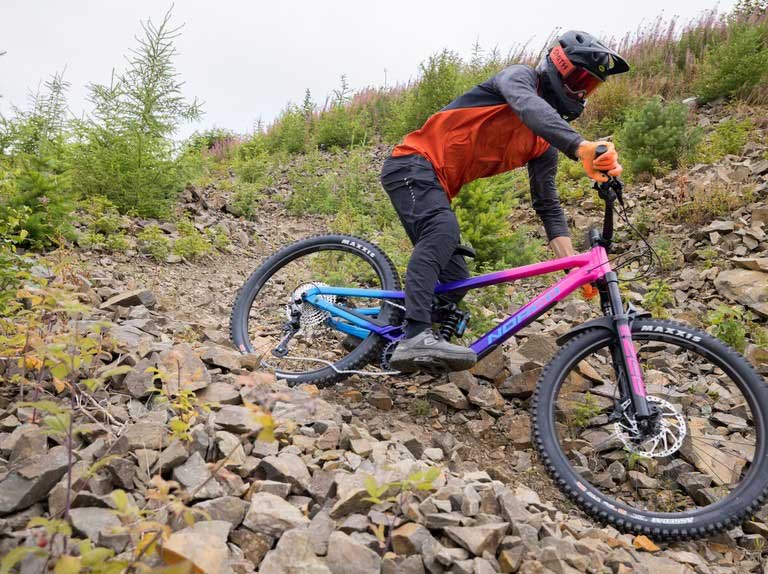
These bikes excel on aggressive terrain, allowing you to tackle any trail with confidence and control. With advanced suspension technology, enduro bikes offer a perfect balance of climbing efficiency and downhill performance. The suspension systems are designed to absorb big hits, while still providing efficient pedaling on the climbs.
Whether you’re riding steep downhill sections or navigating rocky terrain, the suspension on an enduro bike will keep you in complete control. So, choose your favorite trail and let an enduro bike take you on an adrenaline-filled adventure.
How to Buy a Mountain Bike
When it comes to buying a mountain bike, there are a few important points to consider. First, you need to think about the wheel size, as this can greatly affect the bike’s performance and handling.
Next, tire size and rim width should be taken into account, as they can impact traction and stability on different types of terrain. Lastly, choosing a complete bike build is crucial, as it determines the components and features that will best suit your riding style and preferences. By carefully considering these points, you can make an informed decision and find the perfect mountain bike for your needs.
Wheel Size
To ensure a successful mountain bike purchase, consider the appropriate wheel size for your riding style and terrain. The wheel size plays a crucial role in determining how your mountain bike performs on different trails. There are three main wheel sizes to choose from: 26-inch, 27.5-inch, and 29-inch. Each size has its pros and cons.
The 26-inch wheel size is known for its agility and maneuverability. It allows for quick acceleration and nimble handling, making it ideal for technical trails and jumps. However, it may struggle with obstacles and have a slightly rougher ride on rough terrain.
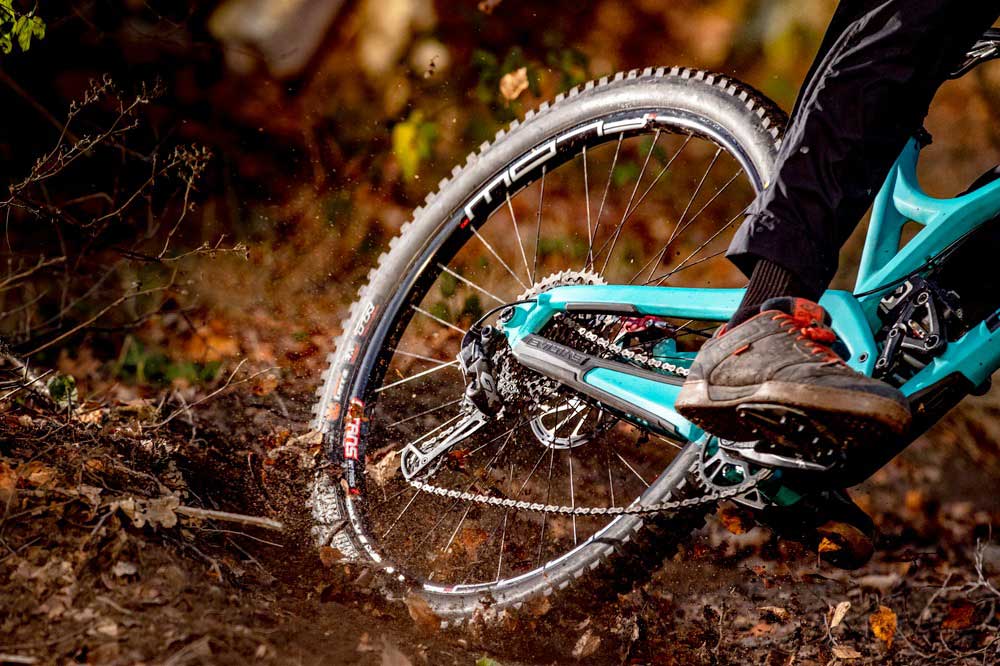
The 27.5-inch wheel size strikes a balance between agility and stability. It offers improved traction and rollover capabilities compared to the 26-inch wheels. It is suitable for a wide range of terrains and riding styles, making it a popular choice among mountain bikers.
The 29-inch wheel size is all about speed and stability. It rolls over obstacles with ease and provides a smoother ride on rough terrain. It excels in cross-country and endurance riding, where maintaining momentum is crucial. However, it may feel less nimble in tight corners and require more effort to accelerate.
When choosing the right wheel size for your riding style, consider the type of trails you frequently ride, your skill level, and personal preference. Test ride different wheel sizes to see which one feels the most comfortable and suits your riding needs.
Tire Size and Rim Width
Now that you have considered the appropriate wheel size for your riding style and terrain, let’s delve into the important factors of tire size and rim width when buying a mountain bike. The impact of tire size on performance cannot be overstated.
A larger tire size, such as a 27.5″ or 29″, offers greater traction and stability, allowing you to tackle rough terrains with ease. On the other hand, a smaller tire size, like a 26″, provides nimbleness and maneuverability, making it ideal for technical trails.
When it comes to rim width, wider rims have several advantages. They provide better support for wider tires, allowing for lower tire pressures and improved grip. Additionally, wider rims enhance the stability and control of the bike, especially during aggressive riding. So, consider your riding preferences and choose the tire size and rim width that will optimize your mountain biking experience.
Choosing a Complete Bike Build
To ensure you find the perfect mountain bike, it’s essential to consider the complete bike build options available to you. When it comes to choosing a mountain bike, the bike components and suspension setup are crucial factors to consider.
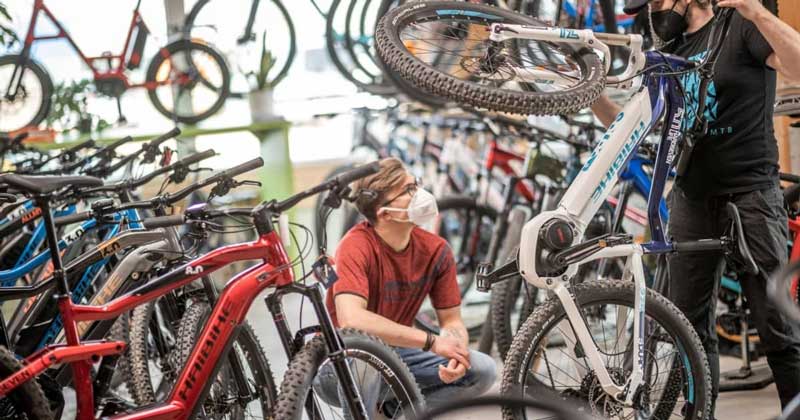
Firstly, let’s talk about the bike components. The components of a mountain bike can vary greatly and can affect the bike’s performance and durability. You’ll want to choose components that are suitable for your riding style and terrain. Consider factors such as the drivetrain, brakes, and wheels when making your decision.
Next, let’s discuss the suspension setup. The suspension system is responsible for absorbing impacts and providing a smooth ride on rough terrain. There are two main types of suspension setups: hardtail and full suspension. Hardtail bikes have suspension only in the front, while full suspension bikes have suspension both in the front and rear. The type of suspension setup you choose depends on the type of trails you’ll be riding and your personal preference.
Frequently Asked Questions
Conclusion
In conclusion, when it comes to finding the best mountain bicycle for your needs, it’s essential to consider factors such as the type of trails you’ll be riding and your personal preferences. The Ibis Ripmo V2 XT, Trek Fuel EX 9.8 GX AXS Gen 6, Specialized Stumpjumper EVO Comp, Yeti SB140 LR T2 TURQ, and Ibis Ripley GX Eagle are all top contenders for their respective categories. By carefully assessing your riding style and terrain preferences, you can make an informed decision and enjoy the thrill of mountain biking to the fullest.

